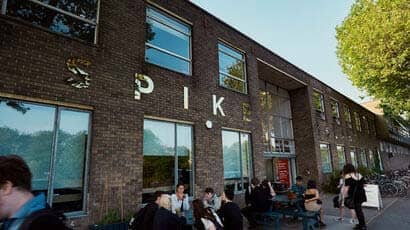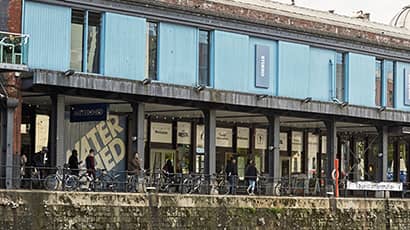
Harnessing creativity and technology
Answering the challenges faced by our society.
We’re harnessing creativity and technology to power economic growth, working in partnership with industry and the public sector to develop the skills, talent, and innovation needed for the future economy.
- Future-ready skills
We connect people, places, and industries to develop the skills and talent pipelines needed for long-term success. Through outreach and training, we help businesses find and train the expertise they need to thrive. - Accelerating innovation and investment
Our University Enterprise Zone (UEZ) is a national hub for innovation, attracting multi-million-pound investments and supporting business growth. - Supporting entrepreneurs
Our innovation spaces – Future Space, Launch Space, Bristol Robotics Lab, and the Pervasive Media Studio – provide start-ups and scale-ups with the space and expertise to turn ideas into reality. - Shaping the future economy
From AI and robotics to cybersecurity and the creative industries, we’re driving progress, strengthening high-growth sectors, and keeping the UK at the forefront of global innovation

Case studies

DRAGoN use and governance of data and its impact
Find out how we're changing the mindset around data and its use.

Making technology work for the greater good of everyone, everywhere
A team at UWE Bristol is co-creating and developing technology and tools that work for the greater good of everyone, everywhere - REE blog.

Developing environmentally friendly liquid robots
UWE Bristol's Unconventional Computing Lab is producing liquid computing and biological computers, that can be recycled easily - REE blog.

Boosting resilience in our creative and cultural industries
Read how our research is boosting resilience in our creative and cultural industries - REE blog.

Case study: Ensuring that new immersive technologies act in the interests of human rights
Our research is ensuring that immersive technologies act in the interests of human rights - REE blog.

Understanding consumer behaviour in the digital age
Find out how understanding consumer behaviour can benefit society.

Transforming the print industry
Our expert printmakers and digital specialists are helping to craft the future of print for artists and commercial producers.

Autonomous vehicles
UWE Bristol experts are taking a crucial role with driverless cars and how they interact with other road users including buses, cyclists and pedestrians.

Confidential data
UWE Bristol research has led to changes in public data sharing laws around the world after proving that a risk-averse approach was ineffective.

Safeguarding public data
Fresh insights into Artificial Intelligence, are transforming the way confidential data is processed and publicised by UK government and statistical bodies.

Global boost for alternative film culture
Activists, artists, filmmakers and exhibitors have joined forces as part of the world’s largest alternative film network.

Art books
Once the preserve of a niche audience, artists’ books have been reframed as a widely accessible art form, connecting artists with fans and collectors.

City of Film
Our research and our support of Bristol's film industry has led to the city being awarded UNESCO City of Film status.

Measuring solid objects automatically
Innovative techniques developed at UWE Bristol for measuring the dimensions of difficult solid objects automatically are now being used commercially.

Novel print processes
From wearable technology that will give people the power to monitor their health, to futuristic composite materials that will make transport more environmentally sustainable, researchers at UWE Bristol are on the case.

Shifting perceptions of criminal justice
Public engagement in the criminal justice system has been enhanced by our work, thanks to an innovative and digitised approach to capturing the history of the UK’s courthouses.
Find a course
RISE beacons

Enriching culture, place and community
We collaborate with national policymakers, local authorities, educators and industry to improve public spaces, infrastructure, and communities.

Securing a green, resilient future
We're tackling global challenges by promoting social justice, empowering communities and protecting the environment, helping to make Britain a Clean Energy Superpower.

Shaping integrated healthcare
Driving innovation in health and social care education, workforce and technology to create a system that prioritises prevention, community-based care and digital transformation.
RISE pillars
Research
World-class thinking that solves real-world problems.
Innovation
Not just ideas – solutions that rewrite the rules.
Skills
Upskilling today to build tomorrow’s workforce.
Enterprise
Enterprise that fuels progress. Businesses that drives change.
You may also be interested in

Watershed
Watershed is part of the City Campus at UWE Bristol. It is home to the Pervasive Media Studio and UWE Bristol’s Digital Cultures Research Centre.

Spike Island
Spike Island is part of the City Campus at UWE Bristol. and is home to a gallery, café and working space for artists, designers and creative businesses.

Computer Science Research Centre (CSRC)
Undertaking fundamental and applied research in computer science.

Digital Cultures Research Centre (DCRC)
The Digital Cultures Research Centre (DCRC) is a loose-knit, collaborative and anti-disciplinary network of researchers distributed across UWE Bristol.
